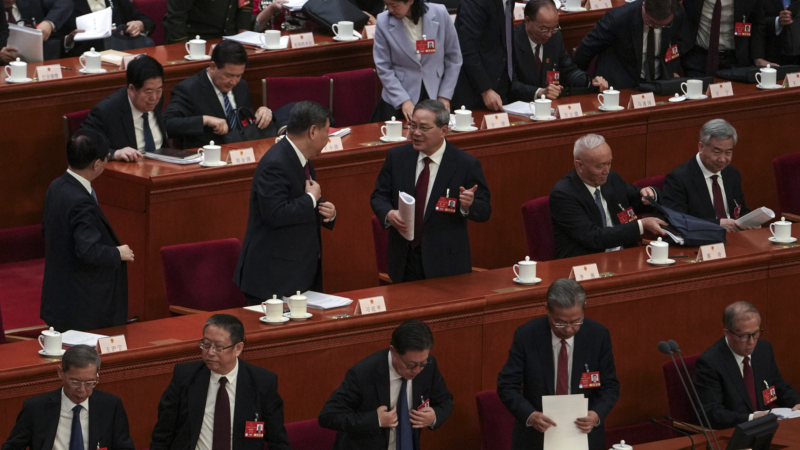China’s parliament opens with confidence about the economy despite tariffs, headwinds
BEIJING — China’s annual session of parliament started on Wednesday with the country’s number two leader projecting confidence while also flagging risks in the economy. Meanwhile, delegates showed little fear in the face of a deepening tariff war with the United States.
Premier Li Qiang said China will aim for economic growth of “around 5%” this year, the same as last year. This comes despite deep domestic challenges and fresh tariffs on Chinese imports to the U.S. a day earlier.
Li said China must face difficulties and problems head on “and have stronger confidence in our development.”
“An increasingly complex and severe external environment may exert a greater impact on China in areas such as trade, science, and technology,” he said in a state-of-the-union-type address before the National People’s Congress.
On the economy, Li said: “Domestically, the foundation for China’s sustained economic recovery and growth is not strong enough. Effective demand is weak, and consumption, in particular, is sluggish.”
Indeed, the Chinese economy has disappointed analysts since the government dropped stringent COVID restrictions at the end of 2022, hobbled by a policy-induced real estate crisis, low consumer confidence and demand, deflationary pressure, mounting debt and accusations from abroad of industrial overcapacity.
Li outlined broad steps to boost the economy. Those included adopting a more proactive fiscal policy and issuing fresh bonds, pursuing a more “accommodative” monetary policy, and placing “a stronger economic policy focus on improving living standards and boosting consumer spending.”
But some economists reckon it will not be enough.
“We remain skeptical that [the measures] will be sufficient to prevent growth from slowing this year, especially given the headwinds on the external front and the lack of a more pronounced shift in government spending towards support consumption,” Julian Evans-Pritchard, head of China economics at the research firm Capital Economics, said.
Last month, President Trump put a 10% tariff on all Chinese imports to the U.S., and on Tuesday added another 10%, arguing that China needs to do more to stop the flow of the deadly synthetic opioid fentanyl into the United States. China has been a major source of the chemical ingredients to make the drug.
Li did not mention the U.S. by name, although analysts say the “complex and severe external environment” that Chinese officials often refer to, and which appeared in his speech, is code for the more competitive U.S. approach to China in recent years.
As delegates entered Beijing’s Great Hall of the People, on the western edge of Tiananmen Square, some expressed confidence that China could weather the tariffs.
“I really don’t feel like it’s like 2018 when everyone in China was like ‘whoa, we have to fight a trade war’. We’re much more calm and collected,” said Tian Xuan, of the Shanghai delegation.
“We have a very big market here in China, we have complete supply chains, and we’re also emphasizing expanding domestic demand…So I believe we have good options to offset the hit to external demand from U.S. tariffs,” he said.
In addition, U.S. tariffs are a good motivator, he said, for China to maintain focus on promoting technology innovation, expand relations with other countries and take other steps to strengthen the economy.
Another delegate, Zhang Qiaoliang of Shandong Province, echoed official pronouncements, saying nobody wins in a trade war.
“I don’t think the U.S. government wants to keep going farther and farther down this path,” he said. “But I do hope the two sides can reach some agreement on this issue.”
New York Giants hire John Harbaugh as coach after identifying him as their top choice
Harbaugh joins the Giants 11 days after he was fired by the Baltimore Ravens. The Super Bowl champion is now tasked with turning around a beleaguered franchise.
US launches new retaliatory strike in Syria, killing leader tied to deadly Islamic State ambush
A third round of retaliatory strikes by the U.S. in Syria has resulted in the death of an Al-Qaeda-affiliated leader, said U.S. Central Command.
NASA rolls out Artemis II craft ahead of crewed lunar orbit
Mission Artemis plans to send Americans to the moon for the first time since the Nixon administration.
Trump says 8 EU countries to be charged 10% tariff for opposing US control of Greenland
In a post on social media, Trump said a 10% tariff will take effect on Feb. 1, and will climb to 25% on June 1 if a deal is not in place for the United States to purchase Greenland.
‘Not for sale’: massive protest in Copenhagen against Trump’s desire to acquire Greenland
Thousands of people rallied in Copenhagen to push back on President Trump's rhetoric that the U.S. should acquire Greenland.
Uganda’s longtime leader declared winner in disputed vote
Museveni claims victory in Uganda's contested election as opposition leader Bobi Wine goes into hiding amid chaos, violence and accusations of fraud.






